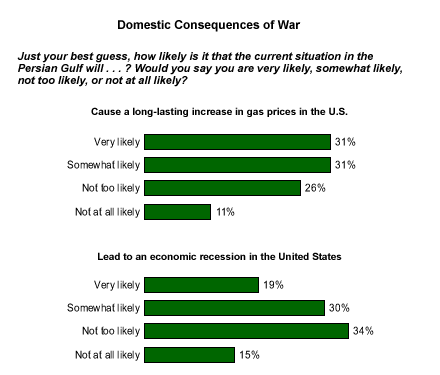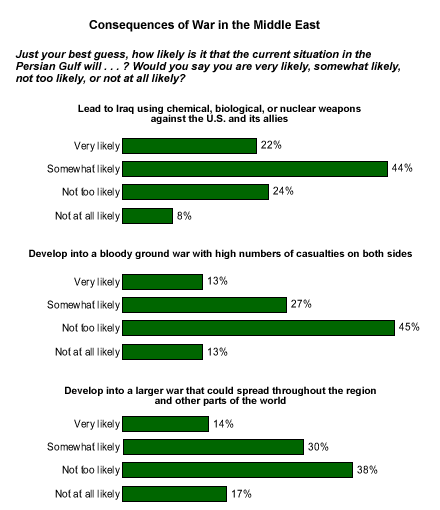Every choice has its consequences. Certainly, the decision for the United States to wage war with Iraq was a momentous one, with potentially life-altering consequences (both positive and negative) for people around the globe. How do Americans feel that the war in Iraq will affect their everyday lives, as well as the lives of those more directly involved in the conflict?
A recent CNN/USA Today/Gallup poll* asked Americans about the potential for various negative consequences associated with the war in Iraq. The results show that the public is braced for some potentially negative outcomes, both domestically and on the warfront itself.
Domestic Effects
Regardless of one's personal opinion about motivations behind this war, oil clearly plays an important role in this campaign. President Bush and U.S. military leaders have stated that one of their wartime objectives is to prevent Iraqi troops from setting fire to Iraq's oil wells. Thus far, they've been relatively successful in preventing fires and putting out those that have started, but the potential threat to the world's oil supply is still very real.
Much of the public seems to believe that the war will affect the oil supply, and that the potential shortage will affect U.S. gas prices. Nearly a third of Americans (31%) say they think the war is "very likely" to cause a long-lasting increase in gas prices in the United States. Another 31% feel that it is "somewhat likely."
The economy represents another significant domestic concern for Americans today. The stock market rally that followed the start of the war may have initially eased concerns, but now the prospect of a longer campaign is dampening some of Wall Street's optimism.
Americans aren't overly optimistic about the consequences this war will have on the economy. Essentially half of the public (49%) thinks it is "very" or "somewhat" likely that the situation in the Persian Gulf will lead to an economic recession in the United States, including 19% who say very likely. Forty-nine percent of Americans also say a recession is "not too " or "not at all" likely as a result of the war.

Perhaps not surprisingly, people's responses to these questions vary according to their opinions on the war. Those who say they oppose the action in Iraq are significantly more likely than those who favor it to say that an increase in gas prices or an economic recession are very likely.
The Dogs of War
When it comes to the negative consequences of the combat itself, Americans express a strong belief that Iraq may use chemical, biological, or nuclear weapons against the United States and its allies. Even prior to the new evidence from the front lines suggesting Iraq's willingness to use such weapons, 66% of Americans say it is very likely (22%), or somewhat likely (44%), that Iraq would use them.
Americans are less likely to believe that the war will spread beyond Iraq to other parts of the world or have a high casualty count. Thirteen percent say it is very likely that the war could develop into a bloody ground war with a high casualty count, and another 27% say it is somewhat likely. On the prospect of the war spreading throughout the region and to other parts of the world, 14% feel it is very likely and another 30% think it is somewhat likely.

Bottom Line
Obviously, the reason that war is considered to be a "last resort" in resolving conflict is because it often brings extremely negative consequences. In the case of the current conflict in Iraq, it appears that a sizable percentage of Americans believe that serious domestic and war-specific negatives are at least somewhat likely to occur. Certainly, perceptions about the likelihood of these consequences are fluid and subject to change in the coming days and weeks.
*Results are based on telephone interviews with 1,020 national adults, aged 18 and older, conducted March 22-23, 2003. For results based on the total sample of national adults, one can say with 95% confidence that the maximum margin of sampling error is ±3%.
